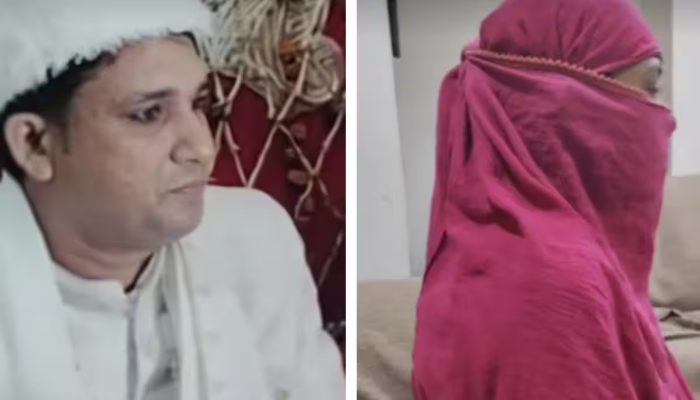Patna Woman Alleges Grooming, Forced Religious Conversion, and Threats: A Case of Entrapment and Deceit
- MGMMTeam

- Jul 3, 2025
- 4 min read
A disturbing case has emerged from Bihar's capital, Patna, where a 27-year-old Hindu woman has accused a Muslim man of deceitfully entering into a romantic relationship with her under a false Hindu identity, coercing her into religious practices, and threatening to kill her when she resisted. The case has sparked discussions around the controversial topic of "love jihad" and the role of coercion in interfaith relationships.

False Identity and the Beginning of the Relationship
According to the First Information Report (FIR) filed by the woman, she first met the accused, Mohammad Siraj Ahmed, nearly three years ago at Nalanda Medical College Hospital, where she had gone for treatment. Siraj, a postgraduate medical student, allegedly introduced himself as “Sonu,” a Hindu man, and gradually developed a romantic relationship with her. The woman claims that he went to great lengths to maintain the façade, even participating in Hindu rituals like Chhath Puja to gain her trust and emotional attachment.
Eventually, the relationship became physical, and the two began living together in a rented apartment. The woman alleges that she believed they would soon marry and that Siraj’s behavior continued to reflect Hindu customs. However, after some time, she discovered documents revealing his real identity. When confronted, he allegedly admitted he had lied about his religion, justifying it by stating that he wanted to win her over and had used deception deliberately.
Allegations of Coercion and Religious Manipulation
What followed, according to the complainant, was a systematic attempt to convert her to Islam. She claims that Siraj began pressuring her to recite the Islamic Kalima multiple times daily, offer Namaz five times a day, observe Ramadan fasts (Roza), and consume beef—all of which go against her religious beliefs. She further alleges that he took her to Sabzibagh, a locality in Patna, where he forced her to eat beef against her will.
When she resisted these demands, she says Siraj resorted to threats and violence. He reportedly told her that as per Islamic law, he could marry four women and that she could only stay with him if she embraced Islam. During this time, he allegedly married another woman during Eid without informing her. On visiting his house to confront his family, she claims to have been assaulted by his relatives, who also mocked her refusal to convert and dismissed her concerns.
Death Threats and the Shadow of Shraddha Walkar
The most chilling aspect of the FIR comes in the form of death threats. The woman alleges that Siraj, during a heated argument, threatened to kill her and dismember her body like Shraddha Walkar—a young woman who was brutally murdered and cut into pieces by her live-in partner in Delhi in 2022. The complainant says he threatened to chop her into “25 pieces” if she resisted him or reported the matter to the police.
She recounts that on May 9, 2025, Siraj lured her to a restaurant under the pretext of reconciliation, only to try to abduct her again. This incident, she says, was yet another attempt to force her back into the relationship and silence her through intimidation.
Delayed Justice and Police Inaction
The woman claims she attempted to lodge a complaint at multiple police stations starting on June 14 but was repeatedly turned away. Her FIR was only officially registered on June 19—five days later—after she approached senior police officials at a public grievance hearing (Janata Darbar), where the Bihar Director General of Police took notice of her ordeal.
The FIR includes grave charges such as rape, cheating, kidnapping, forced religious conversion, and threats of murder. Following the registration of the complaint, Siraj was detained by the police, and investigations are currently underway.
Social Context and Broader Implications
This case has reignited the controversial debate around “love jihad”—a term used in parts of India to describe the alleged practice of Muslim men feigning love to convert Hindu women. While several Indian states, including Uttar Pradesh and Madhya Pradesh, have enacted laws prohibiting religious conversions through deceit or coercion, the term itself remains divisive. Critics argue that it communalizes interfaith relationships and often lacks legal substantiation, while supporters see it as necessary protection against manipulation.
In this specific case, the woman’s allegations involve clear claims of identity fraud, sexual exploitation, religious coercion, and threats to life. Regardless of the larger ideological debates, the legal system is now tasked with determining the facts and ensuring justice is delivered based on evidence.
Conclusion: A Case That Raises Difficult Questions
The Patna case is more than just a personal dispute—it’s a reflection of deeper societal tensions. It raises critical questions about identity, consent, deception, and the state’s responsibility in protecting vulnerable individuals from abuse cloaked in romantic or religious intentions. If the allegations are proven true, the case could become a benchmark in defining legal accountability in instances of religious and emotional manipulation. As the investigation proceeds, it remains essential for due process to prevail, without bias or political pressure, so that justice is delivered to the victim and the truth comes to light.
(Sources: OpIndia, News24Online, ABP Live)




Comments